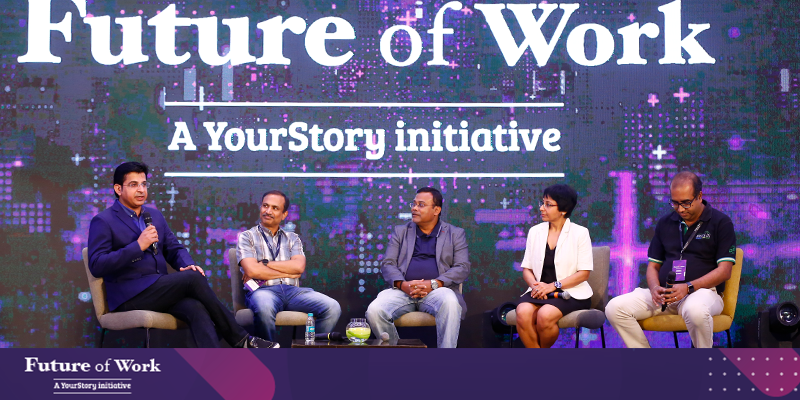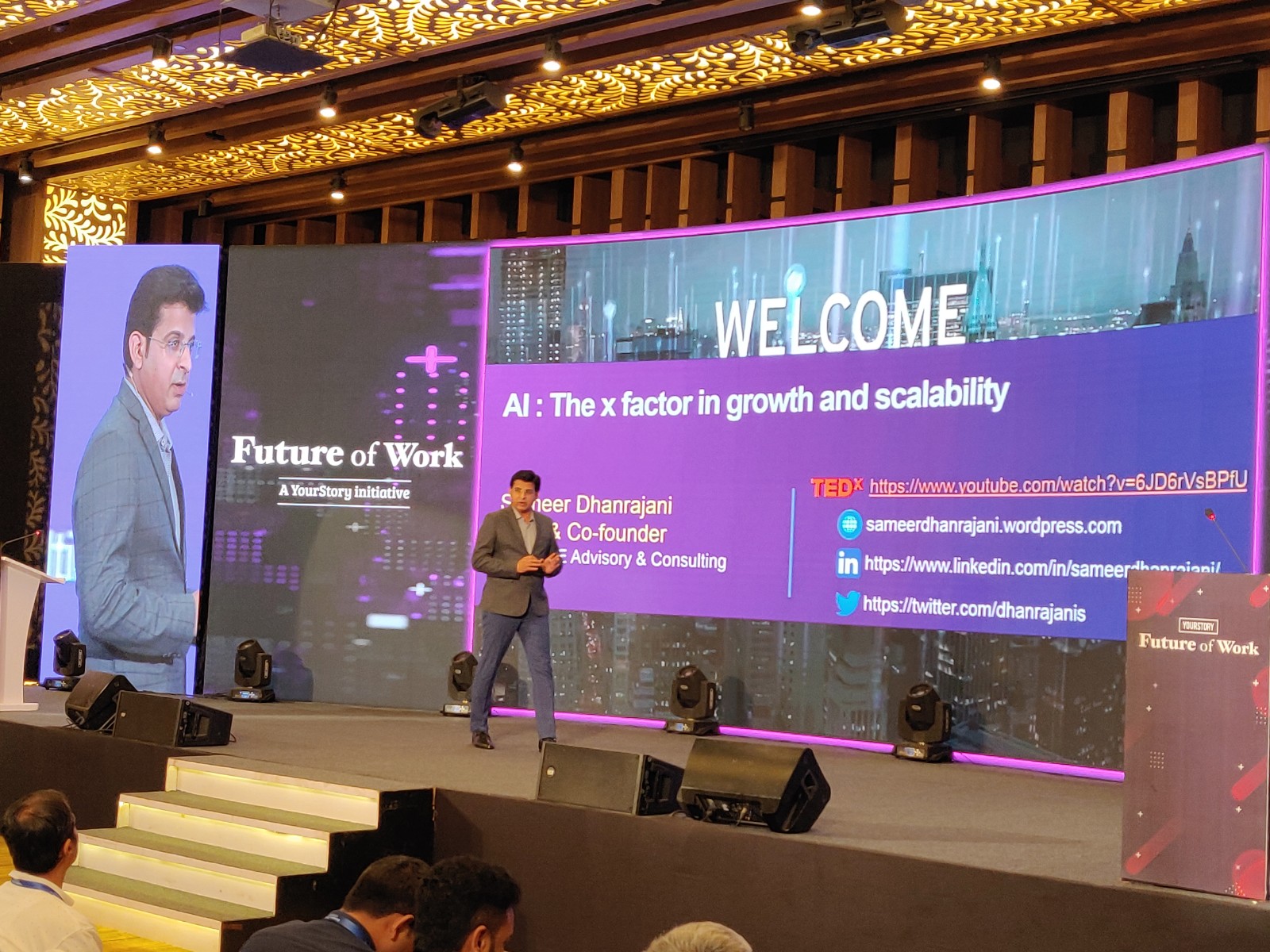
Future of Work 2020: 5 ways AI is disrupting businesses and creating growth opportunities
Add Your Heading Text Here

No conversation around technology today is complete without a reference to artificial intelligence (AI). While the term AI has been around for decades, in recent times, its application across industries, from mining to healthcare, education and finance, among others, is changing the way we live, both at work and at home.
The increasing ubiquity of AI can be attributed to greater processing power and the declining cost of achieving these tasks at increased speeds. The adoption of AI has been so rapid that technology leaders across industries can no longer ignore it for long-term and sustained financial growth.
At the third edition of YourStory’s Future of Work event in Bengaluru on Saturday, AI was the focus of a panel discussion, which drew attention to ‘How AI is disrupting business models and value chains and unleashing transformative and innovative growth opportunities’.
The session was moderated by Sameer Dhanrajani, CEO and Co-founder, AIQRATE, and the panelists were Rajan Sethuraman, CEO, LatentView Analytics; Soumendra Mohanty, EVP Analytics and COO, Tredence; Prithvijit Roy, CEO and Co-founder, BRIDGEi2i; and Iqbal Kaur, Co-Founder, Zylotech. The discussion yielded many insights on the top trends around the technology.
1. Experiments at scale are the need of the hour
It is clear that we are at a stage where we need to experiment at scale.
He added that companies needed to run a lot of experiments. “From a team perspective, I would say how do you figure out how to run multiple prototypes, channels, and experiments.”
2. Every company today is a technology company
CXOs today are concerned with the outcome that they can deliver. “Today, businesses have realised that they are all into technology, regardless of the vertical they operate in,” Iqbal said.
Prithvijit added, “As consumers, we are primarily operating from our mobile devices and have come to expect the same level of experience, whether it is ordering food, booking a cab, or any other service. So, a CXO has no other option but to rethink the way the business operates if s/he wants to remain in business. That’s where data, automation, and AI will be the game-changers.”
3. Disruption is the new normal
Giving the example of Niramai. Ai, Rajan said the healthtech startup was using thermal sensors instead of X-rays to create images that would then be analysed using AI to make more accurate predictions and diagnoses of breast cancer.
“This allows for faster and more accurate treatment. Disruption is possible in several places, and companies and industries are still understanding use cases where AI can be used.”
4. Understanding the AI ‘playbook’
Companies further along their digital tranformation journey are better poised to leverage AI.
“If a company’s core processes are not digitised, then there is not enough data, and AI is a monster that needs to be fed a lot of data. One of the reasons many of our clients did not do well in their AI journey was that a lot of their processes were not digitised. So, we took a step back in the value chain and created that data,” Iqbal said.
“Secondly, we often treat AI as a toy, an experiment, or an innovation. We forget who the main consumer of whatever we are creating is and whom we are disrupting for. If we keep the consumer in mind and have clarity on the problems we are trying to solve, that’s where the magic happens.”
5. Humans and AI will solve problems together
Prithvijit said we were already on the journey where this collaboration is happening.
When leveraged correctly, AI will bring about positive advances that will disrupt value chains across the economy. However, companies will have to guard against misinformation and manipulated and false data that can corrupt output, and AI developers need to be suitably prepared.
Read more at: https://yourstory.com/2020/03/future-of-work-2020-ai-disrupting-businesses
Related Posts
AIQRATIONS

YOURSTORY & AIQRATE jointly unveiled a bespoke report on Data Engineering 4.0
Add Your Heading Text Here

Data Engineering has come out as a prominent area within the AI arena; building robust data pipes has assumed significant importance to fuel machine learning algorithms. At Future of Work 2020 event, YOURSTORY & AIQRATE jointly unveiled a bespoke report on “Data Engineering 4.0: Evolution, Emergence & Possibilities in the Next Decade”.
The report identifies 5G, Data Pipeline+, AI Managed Data Lakes, Edge Cloud and IoT as some of the main drivers for the emergence of Data Engineering 4.0 to realize the much anticipated cross industry collaboration enabled business models involving Smart Cities, Autonomous Vehicles, and Smart Factories.
Related Posts
AIQRATIONS

Future of Work 2020: Sameer Dhanrajani, Co-founder of AIQRATE, shares his take on the power of AI
Add Your Heading Text Here

Will artificial intelligence (AI) take over human intelligence? Is AI applicable across every industry? What is the cost of implementing AI, is it expensive? Is AI complex? AI is not for the masses?
There is hardly any industrial domain today which is not harnessing the benefits of artificial intelligence to accomplish efficiency, accuracy, and affordability, while cutting down on the time taken by manual processes. And yet, there are a million myths surrounding this re-merging tech tool that continues to question the utility and implementation of AI in day-to-day activities.
Sameer Dhanrajani, Chief Executive Officer and Co-founder, AIQRATE Advisory & Consulting, busted some of these myths on Day 1 of Future of Work, India’s largest product-tech-design conference hosted by YourStory.
To explain his point further, he cited the example of Japan’s Makoto Koike. An engineer by education, Makoto went back to his parent’s cucumber farm and began developing a new approach with the help of technology. In the process, Makoto realised there was something in the making – the making of an algorithm, which could give him some understanding about the yield, crop, and the prices. And this is just one area of the application of AI.
According to Sameer, there are at least three strategic imperatives for growth through AI and it involves re-imagining customer experiences, innovating new products and services, and transforming businesses. The AI advisor also touched upon the algorithm economy, explaining how algorithms are impacting modern decision making.
From healthcare to education, sanitation, and marketing practices, artificial intelligence is making its presence felt across sectors today. While AI alone might not be able to address all issues and solve all the problems, Sameer notes that combined with data intelligence and design, it can surely revolutionise the future.
Read more at: https://yourstory.com/2020/02/future-of-work-sameer-dhanrajani-artificial-intelligence

